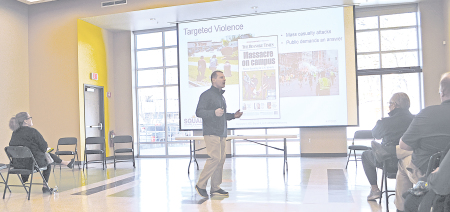Tilting At Windmills: Designated Self-Pity Day - Encore
Published:
August 19th, 2022
By:
Shelly Reuben

Lately, I’ve been hearing a lot from people who demand that everything they desire should be deposited in their laps like petals falling from a Happiness Tree. In honor (or dishonor) of that peculiar sentiment, I thought I should bring back this column from years ago, about life.
And how. … Sometimes, things go wrong.
A car careens out of control and the driver’s best friend is killed. An actor is turned down for the perfect part because he is two inches shorter than the female lead. A dancer’s dream of a career-defining leap across the stage is shattered when she falls and breaks her leg.
Foibles are provided courtesy of an often inconsiderate fate: The young warrior, born for a military career, is kept from following his destiny because his bones are as brittle as potato chips; an executive misses a job offer because her answering machine fails; a brilliant poet pens his couplets in an era when rhyming verse is considered passé; a love affair comes to a bitter end because a letter is lost in the mail.
Bigger tragedies exact greater tolls: Incurable illnesses. Victimized innocents. Husbands, wives, children, friends … dying. Houses destroyed by fire. Catastrophes inflicted by hurricanes. Riots. Tornadoes. Mudslides. Avalanches. Floods. Wars. Bombs. Fraud. Theft. Duplicity. Insanity.
You name it and, guaranteed, one or another disaster of Olympian proportions will be waiting in the wings. None of us can escape some bad news, and some of us have to endure way too much of it.
Which is what I find so amazing. That we can endure. That we should endure. That we must endure. And that, so magnificently and with so much savoir-faire, we so frequently do endure.
Let me tell you about some courageous people in my life.
First, there is my sister. The one I have the stupid fights with. She is awesome in her wisdom, fortitude, and survival skills. Many years ago, she exhibited symptoms that interfered with her ability to move, talk, write, sleep, work, and, bottom line, live.
She went from doctor to doctor seeking a cure, but was told by each that her symptoms were psycho-somatic. She persisted, seeing more and more and more doctors until one, noticing her beautiful eyes, commented that they were a lovely shade of brown. My sister thanked and then corrected him.
“My eyes are green. Not brown.”
The doctor snapped his fingers. Instantly, he had a diagnosis. Her body was retaining copper. The copper had turned her eyes brown. Her sanity was vindicated, her hereditary disease was identified, and, ever since, she has been moving, talking, writing, sleeping, teaching, and being a wonderfully healthy wife, daughter, teacher, and friend.
Which brings us to my cousin. The one I have all of the other stupid fights with.
After my sister was diagnosed, everyone in the family took a blood test to see if we had the same genetic predisposition. Only this one cousin tested positive. She called my sister, told her the test results, and asked, “Don’t you feel sorry for me?”
Without a second’s hesitation, my sister said, “If I feel sorry for you, I have to feel sorry for myself. And there’s no way that I am going to feel sorry for myself.”
And she didn’t. And she doesn’t. And she never will.
Then, there was my writer friend, Betty. Betty had been born in New York City and was just starting to make a name in radio when the great sun of television began to rise in the West.
Betty followed the industry to Hollywood and wrote for such shows such as Hawaii Five-O and The Rockford Files. Years later, after she had become fiction editor for Playgirl Magazine, Betty rejected one of the short stories I had sent in. But she did so with such spunk, “I wanted to buy it, Shelly, but the idiots here won’t let me,” that I had to write back. A correspondence developed. A friendship ensued.
One day, feeling very sorry for myself, I complained to Betty that I had received seventeen rejection letters from publishers on my latest book. She, teaching me a lesson I have never forgotten, snapped, “Call me back when you’ve had a hundred rejection letters. Until then, I don’t want to hear about it.”
It was because of my sister, my friend, Betty, and the noble souls I read about who maintained their resolve and resolved to maintain their courage during World War II – even after they lost sons, husbands, lovers, and friends – who are my role models when times are tough. It is they who inspired my policy for dealing with disappointment, disaster, grief.
My person policy is this: I will give any of you – the butcher, the guy who plays first base for the Yankees, the gal who forgot to pay her mortgage – one designated self-pity day each year.
On that day, you can stay in bed watching cartoons on TV. Eat two gallons of ice cream. Cry over old love letters. Cry because the man or woman you loved died. Cry because you are dying. Cry because you are being evicted. Cry because your spouse is sleeping with your best friend.
Pull out all the stops. Don’t answer the phone. Don’t wash your face.
Don’t comb your hair.
Cry. Cry. Cry.
And because I like you, I will let you in on a secret.
Come a little closer and I’ll whisper it in your ear.
Twenty-four hours in one year is way, way too much time. Long before those twenty-four hours are up, you will be bored. Bored. Bored. Bored.
Don’t let anybody kid you. Self-pity is hard work.
Copyright © Shelly Reuben, 2022. Shelly Reuben’s books have been nominated for Edgar, Prometheus, and Falcon awards. For more about her writing, visit www.shellyreuben.com
Author: Shelly Reuben - More From This Author
Comments








